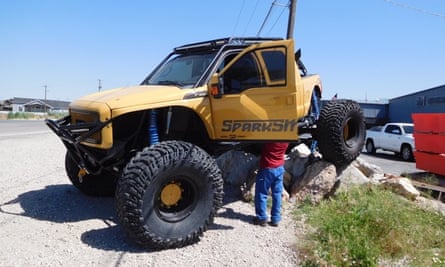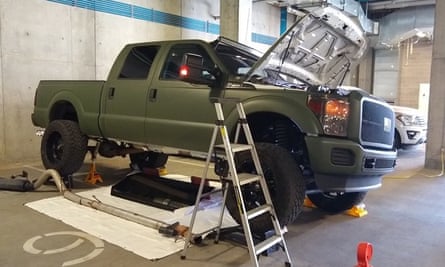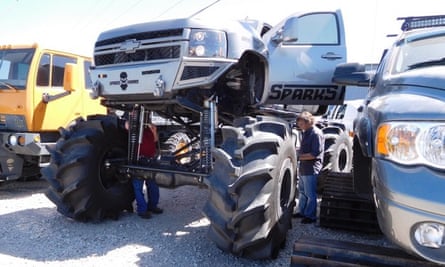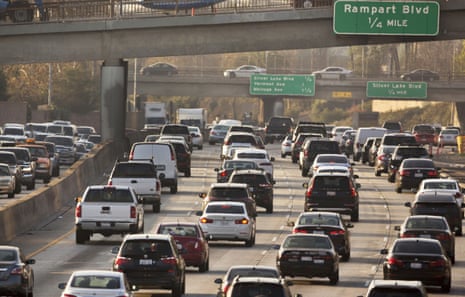When officials at the Environmental Protection Agency began investigating Freedom Performance, LLC, they didn’t have to look very hard for evidence that the company was violating the Clean Air Act. According to legal documents, the Florida car parts distributor literally advertised violations on its website.
“The road to hell is often paved with good intentions,” stated one ad for a kit to remove federally required emissions controls from diesel trucks. It identified a particular emissions control system that “is certainly noble in its intent” but “in reality it is putting your engine through hell … The best solution is deletion.”
According to the EPA, Freedom Performance was advertising defeat devices –hardware and software that bypasses or eliminates emission controls. The Clean Air Act forbids tampering with these controls, and violations carry heavy fines. But defeat devices – also known as “delete devices” – are popular with many vehicle owners.
Shops advertise that “delete kits” will improve mileage and extend the lifespan of expensive components, saving customers thousands of dollars. In recent years, a lucrative cottage industry of defeat devices has exploded across the US as repair shops, online retailers and manufacturers feed, and generate, consumer demand.
The EPA estimates that more than 500,000 diesel pickup trucks have been “deleted” since 2009. The EPA claims that these illegally modified vehicles produced hundreds of thousands of tons of excess nitrogen oxide – the equivalent of adding 9m more trucks to the road. Public health advocates say diesel emissions contribute to increases in fine particulate matter and other airborne pollutants that have been linked to higher rates of cancer, heart attacks, strokes and neurodegenerative diseases.
In recent years, the EPA has escalated a crackdown, resolving more than 60 cases against companies that make or distribute defeat devices since 2017. The penalties can be stiff: in February, the agency announced that Freedom Performance would pay more than $7m for committing thousands of violations. A managing member of the company, Geoffrey Kemper, did not respond to a request for comment.
But the crackdown has left much unresolved.
For one, defeat devices can be easily found for sale in brick-and-mortar stores around the country and online. That has led some public health advocates to launch their own litigation under the Clean Air Act. They have targeted body shops featured on the popular Discovery Channel show Diesel Brothers, where some mechanics have customized huge diesel trucks with names like BroDozer and Truck Norris.
Enforcement of the defeat device law has triggered pushback from body shops and retailers who say the law is confusing and draconian. The industry is backing a bill in Congress written by lawmakers calling themselves the Motorsports Caucus. The bill claims it would protect the right of motorists to convert a highway vehicle into a race car, but that, opponents say, would hamper EPA enforcement of clean air standards.

Delete kits
Once upon a time, turning off the emissions controls in a vehicle was almost as simple as flipping a switch, according to the EPA. But as the agency imposed tighter emissions standards, automakers introduced increasingly sophisticated equipment to reduce pollutants.
Nowadays, defeat devices generally come in “delete kits” with hardware and software to use in tandem. “Tuners”, which plug into a vehicle, install software known as “tunes” that changes how a vehicle’s computer regulates emission levels. Physical devices can be installed in a vehicle’s engine or exhaust system; they include “delete pipes”, hollow tubes that bypass or replace equipment containing sensitive filters.
Though aftermarket defeat devices have always been illegal, the EPA significantly ramped up enforcement around the time of the most notorious automotive industry fraud of the 21st century: the Volkswagen scandal.
In 2013 and 2014, the California government’s air resources board and researchers at West Virginia University discovered that the German automaker had installed a defeat mechanism across its fleet of diesel-engine passenger vehicles. It could detect when the cars were being tested, bringing emissions levels down to regulatory standards.
On the road, however, the vehicles emitted up to 40 times more nitrogen oxides – reactive, poisonous gases – than during the tests. Nearly 600,000 of these vehicles were sold or for sale in the US, and the company later admitted it had manufactured about 11m globally.
The result was a legal settlement that has cost Volkswagen more than $20bn in the US alone, including criminal and civil penalties and investments in emission reduction projects around the country.
“Few companies could survive that litigation,” said John Cruden, assistant attorney general for environment at the time and lead negotiator on the Volkswagen case. “So obviously it has an exceptional deterrent effect.”
The ripples have reached smaller operators in the aftermarket parts industry, which makes and installs defeat devices after vehicles are on the road. They range from subsidiaries of major companies such as Polaris Inc to local garages tampering with controls on a few dozen semi trucks.
One of the first companies to catch the EPA’s attention was H&S Performance.

In 2015, the EPA announced that the Utah manufacturer had agreed to pay a $1m fine for making and selling tens of thousands of defeat devices. According to the consent agreement, the EPA estimated that the H&S tuners had created an additional 71,669 tons of nitrogen oxides. The agency claimed that H&S had committed more than 114,000 violations of the Clean Air Act – one violation for each time H&S sold a defeat device.
Over the next five years, the EPA took aim at companies that had manufactured hundreds of thousands of defeat devices. For example, in September 2018, the agency settled a case with a Florida firm called Derive Systems, which allegedly manufactured and sold approximately 363,000 parts.
Despite these actions, many companies continue to operate with impunity. The clearest evidence is the sheer number of tuners and straight pipes that appear to be openly sold on e-commerce sites, including eBay, and by users on Facebook’s Marketplace platform.
“All you’ve got to do is Google DPF tuner online and you’ll have a hundred places you can buy it today,” David Sparks, a mechanic who has featured on Diesel Brothers, said in a deposition in a court case.
While most sites don’t openly claim that their products bypass emissions controls, eBay vendors sell “delete kits” that do make this boast, despite an eBay policy that forbids the sale of defeat devices. An eBay representative told FairWarning the company would remove the illegal listings, but a search for “delete kits” nearly five weeks later still turned up numerous items for sale.
There is also at least one listing for a “delete kit” on Facebook’s Marketplace platform that remains active days after FairWarning notified the company. Facebook puts the legal onus on Marketplace buyers and sellers, a spokesperson told FairWarning, and only investigates listings when asked by regulators or law enforcement.
Lawsuits
Discouraged by what they see as the EPA’s limited results, public health advocates in Utah are pursuing a novel strategy to eliminate defeat devices.
In 2017, Utah Physicians for a Healthy Environment filed what the group claims was the first Clean Air Act citizen suit against companies selling defeat devices. The law allows private citizens to file lawsuits to enforce emissions standards. Their targets included body shops featured on Diesel Brothers.
County health department data showed that many diesel trucks were failing emissions tests due to deliberate tampering with pollutant controls, and that a deleted diesel typically produced 36 times more nitrogen oxides than allowed by the EPA.
Reed Zars, the attorney who filed the suit, only had to look as far as Instagram and Facebook to find potential violations by some of the companies featured on the TV show.
Zars bought one of the trucks that had appeared on the show and took it to an EPA-certified lab in Colorado for emissions testing. The lab discovered that the modified truck emitted 30 to 40 times the limit for various pollutants.
The Discovery Channel declined to comment.

David Sparks, a body shop owner featured on Diesel Brothers and one of the defendants in the lawsuit, did not respond to requests for comment.
In March, a court ruled in favor of the physicians’ group, imposing over $850,000 in fines and penalties and forbidding the defendants from selling defeat devices.
Last September, the Utah advocacy group went after a bigger target: Tap Worldwide, an aftermarket parts company with dozens of brick-and-mortar outlets across the US. Tap is a subsidiary of Polaris Inc.
According to the suit, Tap has repeatedly violated the Clean Air Act by selling and installing defeat devices. The company, which has asked the court to dismiss the case, did not respond to requests for comment.
In California, the industry is well aware of state rules that are more stringent than the EPA’s, said Stanley Young, spokesman for the California air resources board.
“By now everybody knows how strict California is and anybody who tries to sell unauthorized aftermarket parts in California typically knows that they’re doing it illegally and they have to do it kind of on the down-low,” Young said.
The EPA said it had made more than two dozen educational presentations to various industry groups since fall 2019.
But players in the industry and their supporters in Congress continue to promote the idea that the EPA is targeting people who transform their vehicles solely for racing.
In October 2019, Congress’s “Motorsports Caucus” introduced a bill to protect the right of motorists to convert their vehicles into race cars – the latest version of legislation that has previously failed.
According to public records, the Specialty Equipment Market Association has lobbied for years for Congress to pass such a bill, branding it a commonsense correction to EPA overreach.
The EPA stated in an email that it had no interest in cracking down on those who manufacture, sell or install parts that transform street-legal vehicles into race-cars only operated on a track. What is illegal, according to the EPA, is modifying emissions controls in vehicles that will be used on streets and highways.
The bill’s opponents believe that rather than clarifying the EPA’s scope, it would make enforcement more difficult. The Congressional Budget Office anticipated that the bill would probably force the EPA to shift its focus from manufacturers and sellers to vehicle users.
In the aftermath of the Volkswagen scandal, regulators are devising new ways to catch potential defeat device violations at every level.
The California air resources board, for instance, is testing ways to identify trucks exceeding emissions standards even when they’re on the road, Young said.
Hi-tech solutions may become an effective form of deterrence. For now, though, many companies are still willing to test the law. On 23 July, the EPA announced that it had busted an Irvine, California, company for manufacturing and distributing defeat devices.
This story was produced by FairWarning, a non-profit news organization based in southern California that focuses on public health, consumer, labor and environmental issues. You can sign up for their newsletter here
